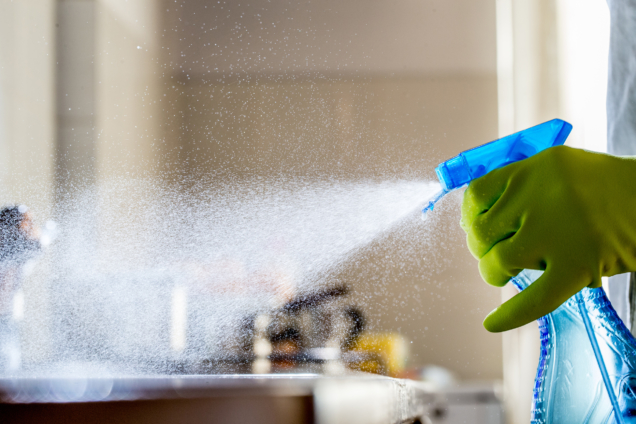The coronavirus driving the current pandemic can live on plastic and stainless steel surfaces for up to three days, researchers say in a study published as a letter to the editor in the New England Journal of Medicine.
And it can linger in aerosols -- the suspension of tiny particles or droplets in the air -- for three hours, the study says.
The study, funded by the US National Institutes of Health, was initially posted online last week, but further details were published in the letter Tuesday.
Essentially, the study finds that the stability of this virus SARS-CoV-2, which causes Covid-19, is "similar to that of SARS-CoV-1 under the experimental circumstances tested."
SARS-CoV-1 is the virus that sparked the Severe Acute Respiratory Syndrome (SARS) epidemic in 2002.
The results add to researchers' understanding of how long the new coronavirus can linger on surfaces and the air, though scientists have said more research is needed.
Some highlights of the findings, according to Tuesday's letter:
- The new coronavirus was viable up to 72 hours after being placed on stainless steel and plastic.
- It was viable up to four hours after being placed on copper, and up to 24 hours after being put on cardboard.
- In aerosols, it remained viable "throughout the duration of our experiment" of three hours.
The study indicates that transmission of the new coronavirus is possible by aerosol and material, "since the virus can remain viable and infectious in aerosols for hours and on surfaces up to days," the researchers wrote.
"These findings echo those with SARS-CoV-1, in which these forms of transmission were associated with" spread in hospital settings, and in "super-spreading events," in which one case can trigger tens or hundreds of cases, the researchers wrote.
Researchers still are investigating
A separate study published last month in The Journal of Hospital Infection found that human coronaviruses, such as the one that causes SARS, have been found to persist on inanimate surfaces -- including metal, glass or plastic surfaces -- for as long as nine days if that surface had not been disinfected.
That was of interest to researchers, because the SARS virus is the closest known relative to the new virus.
Researchers continue to investigate just how long the new coronavirus can linger on surfaces and even in the air, Dr. Maria Van Kerkhove, an infectious disease epidemiologist at World Health Organization, said during a media briefing on Monday.
"As you know this is a virus that is transmitted through droplets and these are little pieces of liquid," Van Kerkhove said. "When they come out of an infected person and individual, they go a certain distance and then they settle ... in that situation, in health care facilities, it's very important that health care workers take additional precaution," such as wear masks.
Van Kerkhove added that when an aerosol-generating procedure or activity occurs in a medical facility, that raises the risk for these particles of droplets to "stay in the air a little bit longer."
CDC: Here's how to disinfect
The US Centers for Disease Control and Prevention has said that the new coronavirus is thought to spread mainly by respiratory droplets, such as droplets in a cough or sneeze.
"It may be possible that a person can get COVID-19 by touching a surface or object that has the virus on it and then touching their own mouth, nose, or possibly their eyes, but this is not thought to be the main way the virus spreads," according to the CDC's website.
In its guidelines on disinfecting a home if someone is sick, the CDC encourages cleaning and disinfecting frequently touched surfaces and objects, such as tables, countertops, light switches, doorknobs and cabinet handles.
Cleaning would be with soap and water, and disinfecting would be with certain bleach solutions or alcohol solutions described on the CDC's website, or EPA-registered disinfectants.
Latest Stories
-
Expansion Drive: Takoradi Technical University increases faculties
3 hours -
SHS heads demand payment of outstanding funds before reopening of schools
3 hours -
We thank God for the 2024 general elections – Akufo-Addo
4 hours -
Coconut Grove Beach Resort marks 30 years of excellence with memorable 9 lessons & carols service
4 hours -
WAFU B U-17 Girls’ Cup: Black Maidens beat Nigeria on penalties to win inaugral tournament
5 hours -
Real Madrid beat Sevilla to keep pressure on leaders Atletico
6 hours -
Liverpool put six past Spurs to go four points clear
6 hours -
Manchester United lose 3-0 at home to Bournemouth yet again
6 hours -
CHAN 2024Q: ‘It’s still an open game’ – Didi on Ghana’s draw with Nigeria
6 hours -
CHAN 2024Q: Ghana’s Black Galaxies held by Nigeria in first-leg tie
7 hours -
Dr Nduom hopeful defunct GN bank will be restored under Mahama administration
7 hours -
Bridget Bonnie celebrates NDC Victory, champions hope for women and youth
8 hours -
Shamima Muslim urges youth to lead Ghana’s renewal at 18Plus4NDC anniversary
9 hours -
Akufo-Addo condemns post-election violence, blames NDC
9 hours -
DAMC, Free Food Company, to distribute 10,000 packs of food to street kids
10 hours

